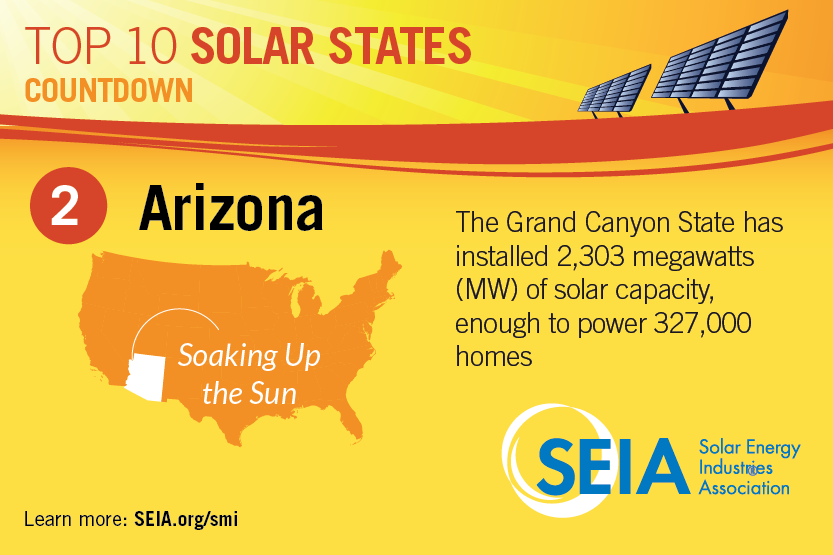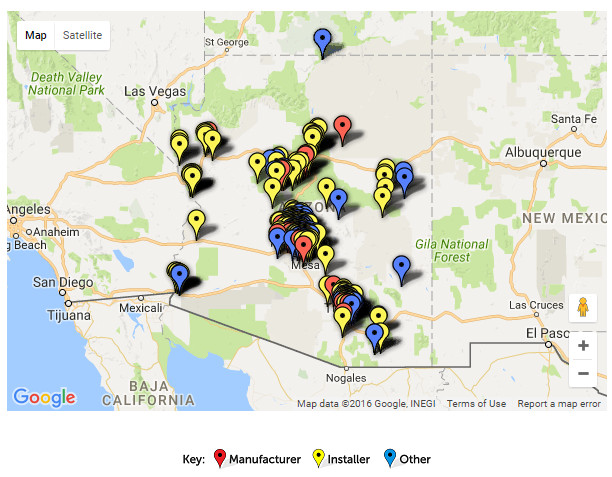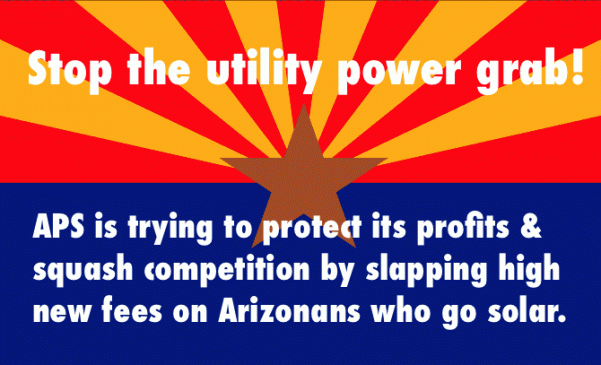As one of the sunniest states in the US, Arizona has enjoyed early and great success as a leader in solar energy production.
With 2,453 megawatts (MW) of solar installed, the US Solar Energy Industries Association (SEIA) ranks Arizona as #2 for total installed solar capacity.
 Arizona ranks number 2 in SEIA’s Top 10 States for total installed solar capacity. Credit: SEIA.org
Arizona ranks number 2 in SEIA’s Top 10 States for total installed solar capacity. Credit: SEIA.org
Expanding 4% over 2014, in 2015, 258 MW of solar capacity was installed, ranking Arizona 5th in the nation for 2015 installed capacity. Over $582 million was invested last year in Arizona’s solar installations.
Currently, the total amount of solar power capacity installed in Arizona is enough to power 348,000 homes, but over the next 5 years, SEIA expects that number to more than double. With over 375 solar companies serving the value chain in Arizona, there are more than 6,900 people employed in the state’s solar market.
With all this tremendous growth in Arizona’s solar industry over the past 4 years, it is sad to see the current negative effects of solar policy manipulation and politics at play in Arizona’s energy arena. Changes in net metering incentives, the imposition of new rate plans, proposed demand rates and grid-use charges, and on top of all of this, politically nuanced media representation have given rise to huge instability in the state’s solar market.
Engaging with local stakeholders and policy makers, SEIA states that it is working to promote “stability and transparency into policies so that the market can recover from this market disturbance and continue to grow.”
A huge back-and-forth exchange between solar proponents and state utilities has developed into a full-blown battle over the value of rooftop solar in Arizona. At the root of the tumult is the view of Arizona Public Service Electric Company (APS) and state regulators that grid-connected solar customers must pay their “fair share” for grid services in the form of an additional fee tacked on to their utility bill. Solar proponents respond that grid-connected solar energy supplies a bonus to the grid that other customers don’t offer, so paying an additional charge is an unfair penalty.
Especially in the face of lowered net metering rates for excess solar energy entering the grid, proposing an additional charge for grid-connected solar customers has really slapped rooftop solar customers in the face and heated up the public debate.
The volley reached the level of drafting competing solar ballot initiatives to amend the state’s constitution, until solar advocates and state lawmakers entered mediation, brokered a compromise, and dropped the ballot initiatives. The ceasefire, brokered between SolarCity (representing “Yes on AZ Solar,” a political action committee funded by SolarCity) and Arizona Public Service Company finally occurred when the two sides agreed to mediate over how solar customers will be compensated for their excess electricity.
The ceasefire was brokered less than 1 hour after the Arizona State Senate initiated steps to send the electorate measures mandating separate rates for rooftop solar customers, and for regulating solar leasing companies as utilities.
Head utility regulator, Arizona Corporation Commission (ACC) Chairman Doug Little, expressed relief at the ceasefire negotiation. He said, “It would have been a pretty ugly dispute between the ballot measures over the summer.”
In August, after 2 full days of testimony before the commission, the ACC rejected requests to add fees for solar customers and to end net metering. Earthjustice attorney Michael Hiatt reported, “This decision is great news for Arizona families and small businesses that plan on going solar, and for everyone who breathes cleaner air as a result.” He added, “The decision sends a powerful message to Arizona utilities that the Commission will not simply rubberstamp their anti-solar agenda.”
However, the squabbles over Arizona’s solar energy future are not over yet. A year-long Value of Solar Docket was opened at this same time last year, hoping to resolve the rancorous debate over solar customer compensation once and for all. The VOS docket could conclude within the next month and promises to offer another round of spectacular fireworks, rhetoric, and politically nuanced media representation. Stay Tuned!
The following is an (untumultuous) in-depth exploration of the state of solar energy in Arizona. Please feel free to offer further contributions in the comments, below.
Cost of Solar in Arizona
Because everyone’s situation is unique, there’s really no substitute to simply getting a solar quote. However, research and data are always being updated and the SEIA reports that installed solar PV system prices in the US have dropped by 12% from last year and 66% from 2010. The latest data indicates that in 2016 the average installed cost of solar in the US is just below $3.50/watt for residential and $2.00/watt for commercial installations.
This means that today it will cost about $17,500 to buy an average-size (5 kW) system at roughly $3.50/watt. In Arizona, 6 kW systems are fairly common, so this price works out to about $21,000.
Even using 2011’s data for monthly savings, at $137 saved per month for Arizona over the course of 20 years, this works out to be $32,880, netting a gain of (at least) $11,880 on a 6 kW system installed in 2016.
What if you don’t stay in your home for the full 20 years? In Arizona, property taxes don’t increase with the addition of a rooftop solar installation, but your home’s sales value increases an average of $5,911 per kilowatt of solar installed, according to a 2013 Lawrence Berkeley National Laboratory (LBNL) study.
So, even if you sell your home in the year following your 6 kW solar rooftop installation, it is reasonable to expect a sales price increase of something like $35,466. This leaves you with a net gain of about $14,466 on your ($21,000) solar rooftop, assuming you sell your house at the asking price. Sell or stay, either way, rooftop solar is a win-win scenario!
Arizona’s Solar Incentives (#InsideSolarBaseball)
Federal Incentives
The federal solar investment tax credit (ITC) is available in all states of the US. Up to 30% of a solar installation’s costs can be credited via the ITC. However, you can only take advantage of the credit once, and only if you have that much tax liability in that tax year. Currently, the 30% ITC extends through 2019 but is scheduled to be phased out after that.
Businesses may also qualify for incentives, including the Renewable Energy Production Tax Credit (PTC), the Business Energy Investment Tax Credit (ITC-1603), and a corporate depreciation incentive, as well.
State Incentives
The following are a few of Arizona’s state solar energy incentives listed on the DSIRE Incentives Database. Operated by the N.C. Clean Energy Technology Center at N.C. State University, the Database of State Incentives for Renewables & Efficiency (DSIRE) offers an up-to-date and comprehensive website for solar energy incentives across the US, including federal and state incentives, programs, and policies.
Arizona’s Net Metering Policy*:
Current Net Metering Program Overview — Last updated: 12/21/2015
• Start Date: 05/23/2009
• Eligible Renewable/Other Technologies: Geothermal Electric, Solar Thermal Electric, Solar Photovoltaics, Wind (All), Biomass, Hydroelectric, Hydrogen, Municipal Solid Waste, Combined Heat & Power, Landfill Gas, Wind (Small), Hydroelectric (Small), Anaerobic Digestion, Fuel Cells using Renewable Fuels
• Applicable Sectors: Commercial, Industrial, Local Government, Nonprofit, Residential, Schools, State Government, Federal Government, Agricultural, Institutional, Senior citizens
• Applicable Utilities: Investor-owned utilities, electric cooperatives
• System Capacity Limit: No capacity limit specified, but system must be sized to meet part or all of customer’s electric load and may not exceed 125% of customer’s total connected load
• Aggregate Capacity Limit: No limit specified
• Net Excess Generation: Credited to customer’s next bill at retail rate; excess reconciled annually at avoided-cost rate
• Ownership of Renewable Energy Credits: Not addressed in net metering rules; customer owns RECs unless participating in a utility incentive
• Meter Aggregation: Not addressed
Net Excess Generation: Accomplished using a single bi-directional meter, customer net excess generation (NEG) “is carried over to the customer’s next bill at the utility’s retail rate, as a kilowatt-hour (kWh) credit. Any NEG remaining at the customer’s last monthly bill in the annual true-up period will be paid to the customer, via check or billing credit, at the utility’s avoided cost payment.”
The NEG rule continues, “For customers taking service under a time-of-use rate, off-peak generation will be credited against off-peak consumption, and on-peak generation will be credited against on-peak consumption. The customer’s monthly bill is based on the net on-peak kWh and net off-peak kWh amounts. Any monthly customer NEG will be carried over to the customer’s next bill as an off-peak or on-peak kWh credit.”
Additional Charges: The ACC requires net metering charges be assessed non-discriminatorily. Any new or additional charges increasing eligible customer-generator’s costs beyond that of other customers in the rate class that the eligible customer-generator would be otherwise assigned to must first be proposed to the ACC for consideration and approval. The ACC also notes that the utility has the burden of proof in any such cost increase proposal.
In December 2013, responding to an application from APS addressing cost shifting, the ACC ordered a $0.70 per kW charge (a $3.50 monthly charge for a 5 kW system) for all residential distributed generation systems installed on or after January 1, 2014.** However, this charge doesn’t apply to customers with systems installed on or before December 31, 2013. The ACC also requires APS to file quarterly reports about the number of new distributed generation installations per month, the kW size of those installations, and to report the amount of revenue collected from customers through the lost fixed cost recovery charge. Other utilities have also proposed additional charges for customer-generators.
*Salt River Project (SRP) and municipal utilities do not fall under the jurisdiction of the Arizona Corporation Commission, and are therefore not subject to the state net metering rules–see SRP Net Metering Program Overview, below.
**The charge applies specifically to “distributed generation” systems, not “net-metered systems.” However, as net metering only applies to systems located on the customer’s premises, this charge will affect net metering customers. The charge only applies to APS customers.
Salt River Project (SRP) — Net Metering Last updated: 04/02/2015
Current SRP Net Metering Program Overview:
• Website: https://www.srpnet.com/environment/earthwise/solar/solarelectric.aspx
• Utilities: Salt River Project
• Eligible Renewable/Other Technologies: Geothermal Electric, Solar Photovoltaics, Wind (All), Wind (Small)
• Applicable Sectors: Commercial, Residential, Low-Income Residential
• Applicable Utilities: SRP
• System Capacity Limit: Existing Self-Generation Customers: 300 kW
• New Self-Generation Customers: Not specified
• Aggregate Capacity Limit: No limit specified
• Net Excess Generation: Credited to customer’s next bill at retail rate; held for same time of use period.
• For existing DG customers: excess reconciled annually in April at average annual market price minus price adjustment of 0.00017/kWh
• Ownership of Renewable Energy Credits: Not addressed
• Meter Aggregation: Not allowed
Note: Salt River Project (SRP) requires an interconnection agreement. SRP changed its existing net metering program for residential customers in February 2015. These changes went into effect with the April 2015 billing cycle. However, customers who purchased their distributed energy system or signed a lease agreement before December 8, 2014, are allowed to keep their original net metering rate plan for 20 years.
Net Excess Generation: According to the SRP NEG rules, “The kWh delivered to SRP are subtracted from the kWh delivered from SRP for each billing cycle. If the kWh calculation is net positive for the billing cycle, SRP will bill the net kWh to the customer under the applicable price plan. If the kWh calculation is net negative for the billing cycle, SRP will carry forward and credit the kWh against customer kWh usage on the next monthly bill. However, if the kWh is net negative at the end of the April billing cycle, SRP will credit the net kWh from the customer at an average annual market price. No credits will be carried forward to the May billing cycle.”
Additional Charges: Under SRP’s self-generation plan, customers must pay a fixed monthly service fee based on the size of their electricity service. They also must pay a grid, or demand, charge based on the customer’s maximum energy usage during peak electricity times. According to SRP, the energy charges per kilowatt-hour (kWh) are lower with the customer generation plan than with the standard residential rate plans.
Links to Additional Arizona State Solar Incentives:
• APS — Multifamily Energy Efficiency Program Last updated: 06/16/2016
• Solar and Wind Equipment Sales Tax Exemption Last updated: 05/24/2016
• UES (Electric) — Commercial Energy Efficiency Rebate Program Last updated: 05/16/2016
• UES (Electric) — Residential Efficiency Program Last updated: 05/16/2016
• TEP — Residential Energy Efficiency Rebate Program Last updated: 05/13/2016
• APS — Residential Energy Efficiency Rebate Program Last updated: 03/28/2016
• Energy Equipment Property Tax Exemption Last updated: 03/28/2016
• Renewable Energy Business Tax Incentives Last updated: 03/22/2016
• Residential Energy Efficiency Tax Credit Last updated: 03/22/2016
• Property Tax Assessment for Renewable Energy Equipment Last updated: 03/18/2016
• Residential Solar and Wind Energy Systems Tax Credit Last updated: 06/17/2015
• Non-Residential Solar & Wind Tax Credit (Corporate) Last updated: 06/17/2015
• Non-Residential Solar & Wind Tax Credit (Personal) Last updated: 06/17/2015
• Renewable Energy Production Tax Credit (Personal) Last updated: 06/17/2015
• SRP — Solar Water Heating Program Last updated: 06/18/2015
Arizona’s (Proposed) Energy Storage Policy
Aimed at reducing Arizona’s staggering peak load, a $4 million residential storage program was mandated in July 2016 by the Arizona Corporation Commission (ACC). Arizona Public Service (APS) received a 120-day deadline to firm up the specifics and get approval from the ACC, making this the first time a state besides California has mandated investment in home energy storage.
Totally amazingly, the ACC has initiated this hallmark policy at no additional cost to ratepayers by tapping into an existing fund for energy-efficiency projects. Commissioner Andy Tobin proposed the idea last June. Refined with the help of Commissioner Bob Stump, the proposal passed at ACC’s July meeting.
Commissioner Tobin said, “My view is, why should we be waiting around when we can help stimulate the storage market with surplus funds that are already there, that are supposed to be used for these energy efficiencies?” He added, “We’re missing the boat across the country, quite frankly, in pushing for storage the way we pushed for solar 10 years ago.”
The ACC has mandated that energy storage should help residents lower demand during peak system load times. The proposal states, “Distributed generation technology may require sending more complex price signals not otherwise appropriate for traditional customers,” explaining that the utility “may need to offer participating customers advanced, time-differentiated rate plans.”
“Arizona’s only energy problem in the short [term] and now,” said Tobin, “is peak demand four hours a day, five days a week for three months.” He explained, “When you’re talking 110, 115 degrees on a hot day and you’ve got kids in the house or seniors at home, it’s not like you have a lot of options.”
The ACC’s proposed residential energy storage program offers a new option. Incentivizing residents to use stored energy at peak load times may be the best solution for Arizona. The pilot plan may even lead to a robust market for energy storage in the state, as well as offering significant savings for residential ratepayers.
Commissioner Tobin is optimistic about the future of energy storage for Arizona. “If you can take two hours in storage out of a four-hour peak in an Arizona summer,” he said, “that’s huge.”
Notable Solar Installations in Arizona
The Solar Energy Industry Association (SEIA) lists the following solar installations as especially noteworthy in Arizona:
• Agua Caliente in Yuma County was completed in 2013 by developer First Solar. This photovoltaic project has the capacity to generate 290 MW of electricity– enough to power over 41,200 Arizona homes.
• At 125 MW, Arlington Valley Solar Project II is among the largest solar installations in Arizona. Completed in 2015 by LS Power, this photovoltaic project has enough electric capacity to power more than 17,700 homes.
• Several large retailers in Arizona have gone solar, including Wal-Mart, REI, Intel, and IKEA. Macy’s has installed one of the largest corporate photovoltaic systems in the state with 3,456 kW of solar capacity at their location in Goodyear.

Credit: MacysGreenLiving.com
Solar Companies in Arizona
According to SEIA, there are currently over 375 solar companies employed throughout the value chain in Arizona, ranging from solar system installers to manufacturers. The following is not a complete listing of all solar installers in Arizona, but were chosen and listed based on high customer recommendations and reviews:
Solar PV System Installers in Arizona:
SolarCity — Arizona
3834 East Roeser, Phoenix, AZ 85040
4651 South Butterfield Drive Suite 101,Tucson, AZ 85714
Black Platinum Solar
1505 W Cloud Road, Phoenix, AZ 85086
American Solar & Roofing
1230 W 23rd Street, Tempe, AZ 85282
Sun Valley Solar Solutions
3235 North Arizona Avenue, Suite D7, Chandler, AZ 85225
Energy Solution Providers, LLC
111 N Main Street, Florence, AZ 85132
Arizona Solar Wave
12 West Main Street, Mesa, AZ 85201
Technicians for Sustainability
612 N 7th Avenue, PO Box 1109, Tucson, AZ 85705
PEP Solar
20819 N 25th Place STE B107, Phoenix, AZ 85050
Pacific West Solar
9625 N 21st Drive #9, Phoenix, AZ 85021
Arizona Solar Concepts
1415 E University Drive, Suite A-109, Tempe, AZ 85281
Solar Topps
102 S. 28th Street, Phoenix, AZ 85034
Arizona Energy Pros
20801 N 19th Avenue, Suite 10, Phoenix, AZ 85027
Argent Solar
671 N 137th Ave, Suite 105, Goodyear, AZ 85338
Sky High Energy
22849 N 19th Avenue, Suite 105, Phoenix, AZ 85027
JLM Energy
4401 Granite Drive, Rocklin, CA 95677
Solar Electric Systems & Products, Inc.
P. O. Box 1412, Mesa, AZ 85211
(Please feel free to add your own recommendations and/or reviews in the comments, below!)
How Does Arizona Value Rooftop Solar? (#InsideSolarBaseball)
It is worse than ironic that Arizona should be debating the value of rooftop solar energy generation. The Arizona Public Service (APS) has around $2 billion invested in solar energy capacity, with a portfolio divided between 551 MW of rooftop solar installations and 499 MW of utility-scale solar plants. This past summer, amidst all the tumult and rancor over rooftop solar customer compensation, APS became the first utility outside of California to surpass 1 GW of solar energy capacity.
Reaching this milestone hasn’t exactly promoted solar benevolence among APS, however. As noted in the introduction, APS has rather promoted battle between itself and Arizona’s solar advocates, narrowly avoiding a ballot initiative to amend the state constitution in favor of rooftop solar customers. A rate increase proposal before the Arizona Corporation Commission (ACC) is currently under review, pushing for a mandatory demand charge that would increase residential customers’ bills by an average of 7.96%.
“In its upcoming rate case,” states Solar Strong America Chairman Kris Mayes, “APS suggests ratepayers shoulder an additional $3.6 billion in new costs. That’s real money out of household budgets, and if the ACC can help mitigate those costs by encouraging more rooftop solar energy, then the benefits of rooftop solar must be fully acknowledged.” Mayes, a former ACC Commissioner, adds dryly, “Arizona ratepayers could have cost savings falling from the sky, if our regulators see the light.”
In November, the ACC is expected to vote on a methodology for quantifying the benefits of rooftop solar for utility ratepayers. The “Value of Solar” docket, as the ACC vote is referred to, is a critical pivot point upon which Arizona’s rooftop solar industry is poised, breathless but hopeful for its future.
Retired Congressman Barry Goldwater Jr. and Retired Mohave County Sheriff Tom Sheahan are encouraging all solar advocates to weigh in on the value that rooftop solar and energy choice has in Arizona. In their recent opinion piece, published in the AZ Capitol Times, Goldwater and Sheahan note:
“The Arizona Corporation Commission is holding a proceeding to determine the value of rooftop solar, the value that utilities should pay customers who deliver electricity back to the grid. It is clear that rooftop solar benefits all Arizonans. It drives down costs for utilities by lessening the need to build new generating stations and transmission lines, for starters – costs that are passed onto us.
“Solar gives Arizonans options to generate their own electricity and lower their bills. It reduces pollution. Solar saves water. Solar creates jobs and provides almost 9,000 Arizona families with incomes higher than the national average according to the Solar Foundation. The benefits of our sunshine and rooftop solar are numerous.
“Rooftop solar encourages free market competition. That’s why Arizona monopoly utilities have been trying to undermine rooftop solar. They don’t want you to supply any of your own energy.
“The outcome of the ACC Value of Solar docket will impact all Arizonans. Recent independent studies conducted in other states show rooftop solar provides a long-term benefit to all, whether you have solar on your roof or not.
“If our Arizona Commissioners conclude that solar is not a net positive for everyone, utilities across our state will use this as an excuse to strengthen their monopolies. This will hurt Arizona energy choice and send jobs and business running from the state. All benefits need to be thoroughly considered in the Commission’s deliberations.
“Currently six utilities regulated by the ACC have filed proposals that threaten to eliminate thousands of solar jobs and the growing solar industry. Now, they are hoping that the value of solar proceeding will give them an excuse to do so.
“A fair methodology for assessing all the benefits of rooftop solar would do the opposite and stop the utility assault on rooftop solar in its tracks.
“That’s why it’s important for Arizonans to weigh in. Let regulators know the value that rooftop solar and energy choice has for Arizona. Let regulators know that our values lie in individual choice and freedom, homegrown jobs, innovation and competition.”
Goldwater and Sheahan urge interested people to call the Arizona Corporation Commission and reference the Value of Solar Docket.
ACC Phoenix Office: (602) 542-4251 or 1-(800) 222-7000 (Toll Free In-State Only).
ACC Tucson Office: (520) 628-6550 or 1-(800) 535-0148 (Toll Free In-State Only).
In addition, you can email Arizona’s Commissioners and offer your thoughts on the value of rooftop solar at the following addresses:
• Chairman Doug Little: Little-web@azcc.gov
• Commissioner Andy Tobin: Tobin-web@azcc.gov
• Commissioner Tom Forese: Forese-web@azcc.gov
• Commissioner Bob Stump: Stump-web@azcc.gov
• Commissioner Bob Burns: RBurns-web@azcc.gov
Additional Links for Arizona State Solar Resources
Arizona Corporation Commission – Learn about the governing body that regulates the electricity rates and services of Arizona public utilities
Arizona State Legislature – Track pending legislation affecting solar energy, locate and contact individual legislators, and stay up to date on current legislative issues in Arizona
Arizona Governor’s Office of Energy Policy – Find a wide variety of information on state government energy programs, policy, projects, energy-saving strategies and energy-related statistics
Arizona State University – Solar Power Lab – Read about the innovative solar technology research taking place at Arizona State University
Arizona Goes Solar – Learn about residential and commercial solar energy options and related regulations through a collaborative effort led by the Arizona Corporation Commission and implemented by the regulated electric utilities in Arizona
DSIRE Incentives Database — Arizona – Search a public clearinghouse for specific solar energy incentives in Arizona and across the United States
U.S. Energy Information Administration – Arizona State Profile – Explore official energy statistics, including data on electricity supply and demand, from the U.S. government
BBB Accredited Business Directory — Solar Energy System Design & Installation – Better Business Bureau’s comprehensive directory of Arizona’s solar energy contractors, dealers, suppliers, manufacturers, and distributors
Check out this Youtube clip on Arizona’s Solar Story:
Leave a Reply
Solar Savings Calculator
Get the facts. Find out exactly how much solar will save you, including which Tax and Financial programs you qualify for!










